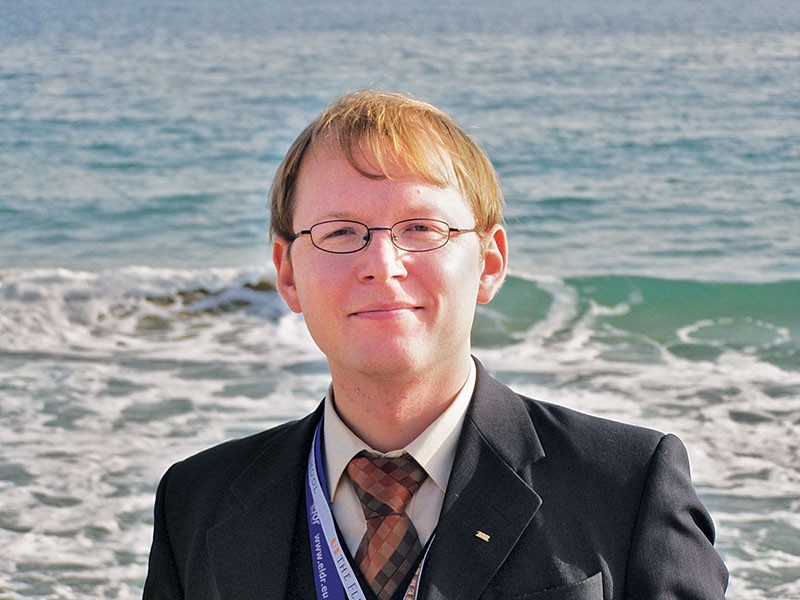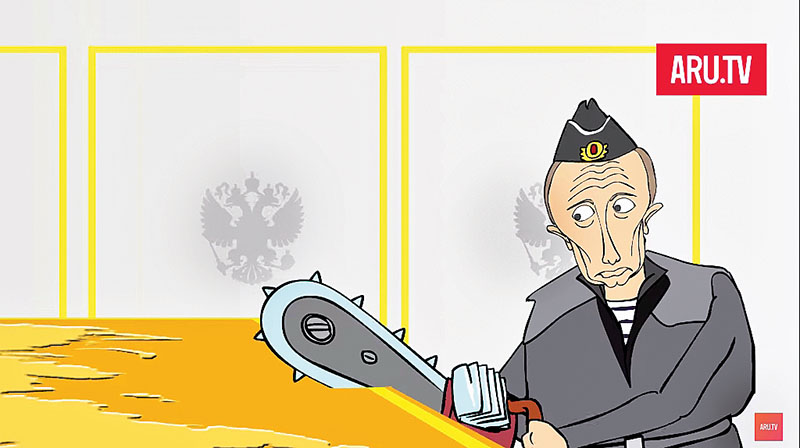Editor’s Note: The MYMEDIA program, a Kyiv Post partner, is a joint venture between NIRAS and BBC Media Action and financially supported by the Danish Foreign Ministry. Content is independent of the donor.
Since 2014, the West and post-Soviet countries have been trying to fight Russian propaganda. Approaches differ: some develop fact-checking departments and conduct their own investigations; some invest in monitoring and analyzing Russian propaganda. The governments of Ukraine and Baltic countries have banned Russian TV channels in order to minimize the influence of propaganda on the local Russian-speaking population.
MYMEDIA talked to Belarusian activist Pavel Marozau, the founder of the anti-propaganda internet TV channel ARU.TV, whose funders include MYMEDIA. Marozau shared his story of fighting for democracy in Belarus, his escape from persecution and how satire and cartoons can be a weapon to combat propaganda.
Belarus to Tallinn
“Marozau, what would you like to do next?” his friends asked him once he got off the train in Tallinn, “go to university, or get political asylum?”
Before fleeing Belarus in 2006, Marozau had been a political activist for six years. He was the one who dared to insult “the last dictator in Europe” personally – he and his little team had produced a series of satirical cartoons called “Multclub,” with Alexander Lukashenko as the dictator-protagonist.
Soon the Belarusian authorities initiated a legal case against him. It was time to get out. He could still exit through the open border with Russia. However, with an arrest warrant covering all former Soviet countries likely soon to be issued, that was a poor option. Luckily, Marozau had visited Estonia and the visa was still valid. Also, many friends had already fled there.
Marozau didn’t want to enroll in a university in Tallinn. He wanted to continue social activities that he had started back in Belarus. A week later he began work on “The New Way for Belarus,” a Tallinn volunteer group of activists, journalists and politicians striving for a democratic future. The organization is celebrating its 10th anniversary.
After six months in Estonia, Marozau understood that he would need the political asylum which his friends had suggested. That became apparent after an incident involving another ‘Multclub’ contributor: While travelling from
Kyiv to Tallinn, his friend was stopped for extradition to Belarus by the authorities in Tver, Russia.
Even today, 10 years later, Marozau’s relatives and friends are still pressured by Belarusian authorities.
“It was especially acute in 2006, 2007, 2008. They even tried to forward my case to Interpol, but it was rejected. The Belarusian KGB would come to my relatives in the mornings without warning,” he says.
Growing audience
After nine years of focusing on Belarus, Marozau and his team in 2015 decided to shift their efforts to combat Kremlin propaganda in Russia, Ukraine, Belarus and the Baltics.
In response to the annexation of Crimea, Russia’s war in eastern Ukraine and the wave of hate speech and disinformation by Russian broadcasters, they created ARU.TV, a Russian language internet TV project.
ARU.TV offers satirical cartoons as well as comments from experts on social and political events.

Pavel Marozau left Belarus in 2006 and runs ARU.TV, which keeps tabs from Estonia on Russia and Belarus. (Courtesy)
In less than a year, ARU.TV has managed to attract an audience of over 90,000 subscribers on Facebook and over 30,000 on Youtube, quickly becoming more popular than established projects such as Russian Grani.ru, Belarussian TUT.by and Ukrainian Espreso.tv., and not far behind the Riga-based Meduza project.
Even so, ARU.TV is run by just 15 people, mostly volunteers.
And while ARU.TV’s traffic drivers are social networks, they still cannot afford to hire a professional social media manager. Marozau and his team are rapidly learning the basics of social media management. “There is nothing super-difficult about social media. One just needs to know some basic rules. And try.”
To reach their target audience, ARU.TV is using different formats: “Satire helps to clear mental boundies, and our interviews with famous political analysts offer ‘food for the mind’, ‘deeper stuff’, ” Marozau says. “If there is a heated atmosphere and polarization – satire works well.”
ARU.TV is not traditional journalism. “What we do is activism with elements of journalism. For standard journalism with impartial news, there is, for example, Meduza. We deliberately give emotional, satirical comments to touch people and make them think.”
Marozau believes that the existence of interdependent projects offering critical content makes a difference, even though they might not have large audiences.

Russian President Vladimir Putin, who wields enormous influence over Belarus, is a frequent target of ARU.TV’s satire. (ARU.TV)
One of the challenges is money. ARU.TV is financed mainly by Western donors, generating only 20 percent of its revenue independently by producing programs and earning money from Youtube advertising.
However, ARU.TV’s goal is to reduce dependency on donors from 80:20 to 50:50. The plan is to achieve this through a crowdfunding campaign on the Ukrainian platform Spilnokosht and on the Western platform Kickstarter, as well as to crowdfund directly from their viewers.
Marozau believes satire is an effective way to reach the audience. “When people laugh at the dictators, it reduces their inner fears and destroys mental boundaries,” he says.
Political satire is more popular in Western media than in the post-Soviet region because the West has a critical thinking and competitive environment. That ARU.TV is located within the European Union is an advantage. “Many pro-democratic media outlets in Russia, such as TV Rain (Dozhd) and Ekho Moskvy still have to take censorship into account when they work from Moscow,” he says.
Resistance to Russia
Marozau believes that one reason for the success of Russian propaganda in the Baltics lies in the discrepancy of financial resources.
“Russia has invested a lot of money in their propaganda in key countries – the U.S., Germany, U.K.. Their idea is to create a cluster of media which attacks precisely the weaknesses of Western democracy.” Russia targets people disappointed with the political order and fosters radical movements in the West. If we compare the budgets that
Western countries allocate for media development in the entire region with the budgets of Russia Today and Sputnik – they are just drops in the ocean. The money that Western donors are spending on support of democratic media in the region in 2017 equals the budget of one or two shows on big Russian channels”, Marozau states.
The Western tendency to hesitate and debate rather than act also contributes to Russian propaganda.
Western governments supported a Russian-speaking TV channel to offer Russian-speaking Estonians an alternative to Russian propaganda. In 2015, Estonia launched the ETV+ channel, with an annual budget of 2.5 million euros. Marozau is skeptical.
“We often believe some kind of gods create the media agenda in the West. But in fact, they have not dealt with propaganda since the days when Voice of America and Radio Liberty were created in the 1950s,” he says. “The idea was to create a channel that would ‘re-direct’ people from the news agenda of the Russian TV channels, with programs about Estonian life, household and cooking shows. I can not say that it has worked.”
Marozau is even more skeptical about the way Western donors are working with civic activists in Belarus. The West is willing to tolerate the Belarusian dictator’s human rights violations because “Lukashenko is still a lesser evil than Putin.”
Marozau warns that if Belarus granted a base to Russian troops, Russia might invade the Baltic states and cut them off from Europe.
“Now this is the deal: the West offers friendship to Lukashenko on condition that he is ready to compromise and does not become a complete Russian ally. And in return they are ready to sacrifice something that already does not work – namely surrender the opposition and civil society,” Marozau predicts. “We claim to be fighting for freedom and democracy, but it is no longer ‘fighting.’ We need to stick to our values. Why would people choose a politician from the opposition, if in the eyes of the ordinary worker he is a lackey of Lukashenko?”
Yana Biliaieva is a journalist with MYMEDIA.
